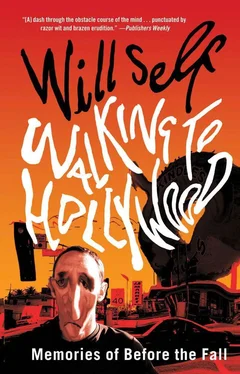Will Self - Walking to Hollywood
Здесь есть возможность читать онлайн «Will Self - Walking to Hollywood» весь текст электронной книги совершенно бесплатно (целиком полную версию без сокращений). В некоторых случаях можно слушать аудио, скачать через торрент в формате fb2 и присутствует краткое содержание. Год выпуска: 2011, Издательство: Grove/Atlantic, Inc., Жанр: Современная проза, на английском языке. Описание произведения, (предисловие) а так же отзывы посетителей доступны на портале библиотеки ЛибКат.
- Название:Walking to Hollywood
- Автор:
- Издательство:Grove/Atlantic, Inc.
- Жанр:
- Год:2011
- ISBN:нет данных
- Рейтинг книги:4 / 5. Голосов: 1
-
Избранное:Добавить в избранное
- Отзывы:
-
Ваша оценка:
- 80
- 1
- 2
- 3
- 4
- 5
Walking to Hollywood: краткое содержание, описание и аннотация
Предлагаем к чтению аннотацию, описание, краткое содержание или предисловие (зависит от того, что написал сам автор книги «Walking to Hollywood»). Если вы не нашли необходимую информацию о книге — напишите в комментариях, мы постараемся отыскать её.
Walking to Hollywood — читать онлайн бесплатно полную книгу (весь текст) целиком
Ниже представлен текст книги, разбитый по страницам. Система сохранения места последней прочитанной страницы, позволяет с удобством читать онлайн бесплатно книгу «Walking to Hollywood», без необходимости каждый раз заново искать на чём Вы остановились. Поставьте закладку, и сможете в любой момент перейти на страницу, на которой закончили чтение.
Интервал:
Закладка:
I found the scrap of photograph unsettling — wrong, even. Once I’d taken it home and clipped it to the shade of an Anglepoise lamp in my writing room, far from receding into the rest of the tat, the man in it forced himself into my consciousness, his eyes frequently catching mine. The mirror behind the bar he sat at, unseen in the photograph, but perceptible as a luminescence countering the camera flash on the beer taps; the utter anonymity of the man, the image created by impulse, in two rips — all this made of it a contemporary version of those painted Russian icons where perspective is deformed in the service of worship. This outsized and hieratic figure was, I concluded, a saint, to be viewed through a hagioscope from the side aisle where I sat, worshipfully typing.

I corrected the proofs for the new collection, and, although long accustomed to the excruciation of my own prose, there was a fresh focus for this. Previously, it had been the bloody style coagulating on the page — that, and the very grating mechanism of metaphor itself: such and such was like such and such; this was like that… arrant nonsense! Ask De Niro as Vronsky: this is always this; things are nothing more — or less — than themselves. Now individual words began to get to me. Badly. In this particular text it was ‘even’, as in the sentence, ‘At night, even in the nick, he rubbed whitening powder into his tan cheeks.’ Irrespective of context, changing ‘even’ to ‘especially’ would hardly change the sense — at least, not so as anyone would give a shit. The evens — which were everywhere I looked — were trumpeting to me, if to nobody else, the increasingly parenthetic (and thus provisional) nature of my own work. I even hated the look of the word, a failed palindrome. I stared at it malevolently, willing it to transform into ‘never’.
The very evenness of even disgusted me; a spondee, its syllables equally stressed, I found it doubly stressful . It also reminded me of my father, of whom it was often remarked that he had ‘a remarkably even temper’. Even to think of his phlegm was enough to rouse my choler. In the years since his death I had resolved my issues with him, operating like a family therapist who views dysfunction comfortably from behind the mirrored glass of mortality, yet I knew that he’d think the books I was writing exhibited both a profound negativity as well as a satirical miniaturism that he was fairly (fairly!) critical of when alive. True, his mildness meant he was ill cast as a punitive superego, and when I compared his gentle critiques with the execrations that issued forth from the death masks of friends’ parents, it occurred to me that, although I was losing my memory and my sight, I remained preternaturally sensitive.
So, there were these: the amnesia and agnosia, the myopia and logophobia. I was as disengaged from the zeitgeist as my father — who had been a conscientious objector during the Second War — for, while much of the commonality were passionately engaged with their support for — or alienation from — campaigns against nouns (the ‘War on Drugs’ and that on ‘Terror’ being the most salient), I was trying to defeat an adverb . In sum: it was all these yappy feelings that herded sheepy me towards another walking tour, whilst the very erosion of my memory drew me, seemingly ineluctably, towards the Holderness coast of East Yorkshire, the 35-mile stretch of crumbling glacial till between the chalk cliffs of Flamborough Head and the shingle spit of Spurn Head.
Carried along in the mudslide of my amnesia were pathetic fragments of childhood recall. One was of Michael Barratt, the presenter of the long-lived BBCI current affairs programme Nationwide , interviewing a man in a house that was tumbling down a clayey cliff. The homeowner was saying, in broad Yorkshire accents, as he stood in one half of a conservatory — the other half was nowt but a jumble of broken spars and cracked panes — ‘I can’t oonderstand it, I only poot those UPVC windows in two year ago — and now loook at the place!’
Even at the time — and I cannot have been more than eleven or twelve — I remember thinking that this fellow must have been formidably stupid to have invested in a property on the brink of a sea cliff; for had Barratt not just told the viewers that this was the fastest-eroding coast in Europe? That its biscuity loess was being dunked, then chomped, by the North Sea at the prodigious rate of two whole yards every year, as fast, in geological terms, as a speeding bullet?
Then again, I may be giving too much credence to a capacity for retention that I’ve already conceded is ruptured, because, now I come to think of it, Barratt seldom ventured beyond the Lime Grove studios from where Nationwide was put out live. These local interviews were conducted by regional reporters and screened via a feed. Barratt, with his distinctively 1970s hairdo — a splodge of ice cream rippling over his forehead — was a rock of a presenter, who, even when the mass medium was only twenty-odd years old, still managed to fuse dash and paternalism in a uniquely televisual way.
A snappy clarion of horns, a rappel of strings: ‘Dadadaaa! Dada-daaa!’ ‘The Good Word’ by Johnny Scott leapt down the scale accompanying the beguiling title sequence. Archetypes of modern Britain appeared in quick succession: a car accelerating up on to the Severn Bridge; a man with a child in his arms; the Tyne at Newcastle; a man speaking on a car phone the size of a small car; electricity pylons stalking across countryside; the ectomorphic cooling towers of a power station with sheep grazing in the foreground; a train disgorging commuters.
These vignettes took up alternate spaces with the Nationwide logo in a 3 X 3 grid, the logo being simply the letters ‘NW’, with the arm of the W and the leg of N curled so as to cuddle the couple. In retrospect this logo was strongly evocative of the Nazi swastika, while the sequence evoked our own naive faith in technological advance. The very rapidity of these images of motion, then the way the ‘NW’ logo multiplied, streaming in threads across the screen to form four revolving cogs, while ‘The Good Word’ went on ‘Dada-daaa! Dada-daaa!’ing — all this I am able to summon up despite Nationwide being closer to the Normandy landings than I am now to it. I wonder, has each generation’s perception of time — its decadences, its stratigraphy — always been like this? Or is our current sense of time piling up into a necessarily terminal moraine of events simply a function of the digitization of knowledge, which makes it inevitable that the entire networked society will end up, like poor Funes in Borges’s tale ‘Funes the Memorious’, unable to delete a single paltry occurrence or cultural factoid?
And so, there will be Holocaust Remembrance Day, and Holocaust Remembrance Day Remembrance Day, and Holocaust Remembrance Day Remembrance Day Remembrance Day, and Holocaust Remembrance Day Remembrance Day Remembrance Day Remembrance Day — until the significance of the Holocaust itself — which no one any longer living has had direct experience of — is quite forgotten.
I repeat, a culture that is afflicted with such a hyperthymestic syndrome will never recoup itself, never experience the necessary downtime for renaissance to occur. ‘It was very difficult for him to sleep. To sleep is to be abstracted from the world; Funes, on his back in his cot, in the shadows, imagined every crevice and every moulding of the various houses which surrounded him. (I repeat, the least important of his recollections was more minutely precise and more lively than our perception of a physical pleasure or a physical torment.)’
Читать дальшеИнтервал:
Закладка:
Похожие книги на «Walking to Hollywood»
Представляем Вашему вниманию похожие книги на «Walking to Hollywood» списком для выбора. Мы отобрали схожую по названию и смыслу литературу в надежде предоставить читателям больше вариантов отыскать новые, интересные, ещё непрочитанные произведения.
Обсуждение, отзывы о книге «Walking to Hollywood» и просто собственные мнения читателей. Оставьте ваши комментарии, напишите, что Вы думаете о произведении, его смысле или главных героях. Укажите что конкретно понравилось, а что нет, и почему Вы так считаете.












